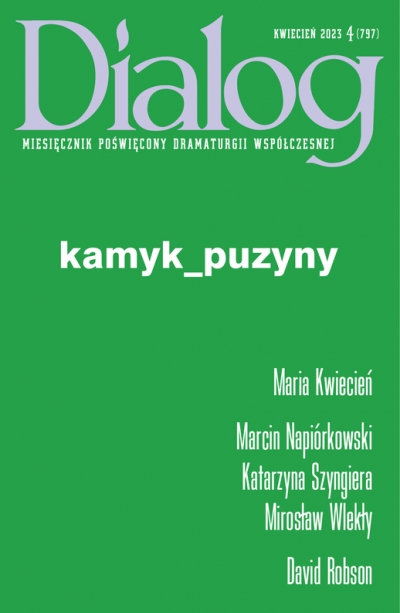Plays
- Maria Kwiecień Grimm's Fairy Tales
A poetic text inspired by the cruel fairy tales by the Grimms, primarily the scenery of the forest, amazing and impossible to present, but also the imagination of the surrealist Erna Rosenstein, therapeutic violence (Freud, Bettelheim and others), the world of an autistic child, and finally the Holocaust. An important and only slightly fairy-tale motif here are twins - a symbolic figure of splitting, but also the object of cruel medical experiments. The stove from the fairy tale about Hansel and Gretel also takes on a new meaning. Using the language of echolalia, automatic writing, folk songs and nursery rhymes, Maria Kwiecień poses the most important questions about the mechanism of trauma, biological determinism and the sources of evil in man.
- Marcin Napiórkowski, Katarzyna Szyngiera, Mirosław Wlekły 1989
The libretto of a hip-hop musical about the history of Solidarity, from the strikes in the Gdańsk Shipyard in August 1980 to the eponymous year 1989 and the first democratic elections. We get to know the attitudes and private lives of the heroes and heroines of the political opposition: Lech and Danuta Wałęsa, Jacek and Gaja Kuroń, Władysław and Krystyna Frasyniuk create various models of relationships, and sing about life in People's Poland in love duets. At the same time, history is being made - Martial Law, internments, the Nobel Peace Prize, negotiations with the authorities, the first divisions in the Solidarity community. The musical claims the place of women in history with a flourish (large cast!), and thrillingly shows the intricacies of an important and complicated decade, the effects of which have continued to this day.
- Andrzej Bołtuć, Konstanty Puzyna My House is Your House
A rediscovered comedy by sixteen-year-old Konstanty Puzyna, later editor-in-chief of “Dialog”. Puzyna wrote it together with a friend in the autumn of 1945. The story takes place in their shared apartment in Toruń, where they both crowded after the war with their mothers, aunt, sister and picturesque roommates from the artistic circles, as well as in the theatre buffet that their mothers ran. It is a play à clef. (as the authors portrayed specific people), not always legible for today's reader, but full of humour and interesting as a comedy of manners.
- David Robson Birthright
The story takes place in the USA, in one of the states that tightened the abortion law. A woman in her forties decides to have an illegal procedure performed at her home by a thirty-year-old man without papers. She does not want to give birth as she has reasons to believe that the child has congenital genetic defects. But David Robson does not make the “abortion or not” dilemma the theme of his piece. Methodically, step by step, the author shows the illegal procedure with all its cruelties, depriving everyone of dignity and not removing responsibility from those who have led to the radicalization of abortion laws.
Essays, Studies
- Magda Pałka Samus Aran at Scena Robocza
On the phenomenon of the Scena Robocza [Working Stage] in Poznań, with particular emphasis on the impact of women and queer people collaborating with Adam Ziajski on its current shape. The first part of the text presents the Stage short history and the most important initiatives that have been undertaken for over a decade of its activity. The second part of the text discusses the influence of Aleksandra Kołodziej, Dominika Mądry, Ola Juchacz, Agnieszka Różyńska, Alicja Piotrowska, and Katarzyna Nowaczyk-Basińska on both the programme and profile of the Stage.
- We have got titles that are our capital
Julia Niedziejko talks to Dominika Mądry, Zosia Rogowska and Adam Ziajski from the Scena Robocza in Poznań.
- Joanna Szczepkowska Adventure with „1989”
In the 1989 musical, the audience sees their lives through the eyes of a new generation. This is a historically accurate view, but from the angle of people free from myths, who have the right to look at the legend from their own perspective. There is also some new force in it - the strength of teamwork and community, not only at the level of rehearsals, but also at the level of the concept and then at the level of the text, the authorship of which does not belong to one creator. The text is collective. Here, each song has its author, and the authorship is “we”.
- On liking musicals
A conversation between Kacper Siedlecki and Kornelia Sobczak about revolutionary musicals: Les Miserables and Hamilton.
- Przemysław Czapliński Other “We”.
1989 musical tells a dramatic and confusing story from Martial Law to the first (almost) democratic elections. It is based on specific biographies of three married couples (the Wałęsas, the Kurońs and the Frasyniuks), but it does not privatize the common history, preserving the social nature of the changes. It has its goal, which is “Can we finally have a positive myth?”.
- Magdalena Kos Some people in the right places
Reading Birthright by David Robinson, it is impossible not to ask yourself the question: how could this have happened? How could it have happened that Americans who value such concepts as freedom and liberty the most live in a country where abortion is banned and abortion clinics are closed? The article presents the history of the changing role of the Supreme Court, which in 1973 provided American women with access to the procedure, but after fifty years overturned this decision, leaving it to individual states.
- Katarzyna Niedurny Konstanty Puzyna. About a boy
On the childhood and early youth of Konstanty Puzyna, born in 1929, a critic and editor-in-chief of “Dialog” for many years.
Columns
Marek Beylin, Justyna Drath, Pedro Pereira
Varia
Notes on plays: Ivana Sajko Crna kutija za kraj svijeta. Bajka o maloj Jeanne; Remigiusz Grzela Jest tylko pustka. Jest tylko pełnia; Magda Żarnecka, Przemysław Jaszczak Samotny tata.
Playbill
LIBRARY



